Police Work: The breaking of an honest cop Chapter 5
Chapter 5
Less than two weeks after I testified at the second hearing things got progressively worse for me. Whatever thoughts I was entertaining in the back of my mind that maybe the sheriff would lay off of me, never came to fruition.
I had heard that the attorney general’s office, the sheriff and the commonwealth’s attorney were extremely angry about the judge’s decision and that I had better watch my back. Cops who were still talking to me thought that I might be set up for something.
Another cop stated he was down in Richmond [Virginia] at a training class and that there were cops from Loudoun in the class, close friends of the sheriff, who were trashing my name, that they were saying things that were just not true about me. They were all spineless little cowards, not man enough to say anything to my face.
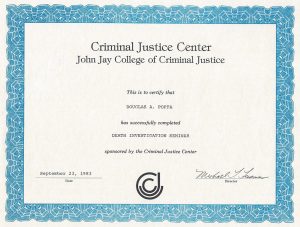 Early on after the first hearing I had my own worries that someone might try to set me up for something, so I started to take measures as best I could. When I talked to the FBI they had similar concerns.
Early on after the first hearing I had my own worries that someone might try to set me up for something, so I started to take measures as best I could. When I talked to the FBI they had similar concerns.
I never left the house unarmed. Every time before I left my apartment I would place things a certain way and fixed my front door so I would know when I returned if anyone had entered while I was gone.
I took the same measures with my vehicle every time I exited it. It was a real pain in the ass. I didn’t want to get to the point of being paranoid, but it was something that I had to do, every single day for months on end.
After my testimony I was subject to a suspension, then a demotion to civil process server.
The Loudoun Times Mirror wrote in an editorial, “… Poppa was transferred from his job as an investigator and told to serve warrants. In effect that is a demotion. Then he was suspended for two weeks for talking to the media, publicly criticizing the Sheriff’s Department and taping conversations against department rules. The Sheriff’s Department may not be punishing Poppa because of his testimony, but to those looking in from the outside the measures look punitive. It appears that the department demoted and suspended Poppa because he is not being a team player. Unfortunately, gagging his First-Amendment rights is not the way to shine light on the truth.’
I was charged with being covered and followed by the press, as if I could do anything about that and that I had spoken to the media.
The sheriff showed a lack of familiarity with rudimentary First Amendment protections. The fact I was newsworthy was because I uncovered misconduct by the prosecutor and my own department.
I had the nerve to defend myself against the prosecutor, his chief deputy, the sheriff and his cronies who were continually on and off the record, making character attacks on me following my testimony in November 1991. The more they attacked me the more newsworthy I became.
CBS News came out and interviewed me for a segment of the 60 minutes spin-off, Street Stories with Ed Bradley.
The sheriff ordered an internal affairs investigation. Not to uncover who had been telling the truth, of course not, but what I had told the press and the FBI. That’s what they wanted to know.
When CBS news was at my home interviewing me on my own time, the sheriff wanted to know what I had told them. It was none of his damn business what I told the press or the FBI. When all this started I had gone to him and asked him for help. He didn’t want to hear anything I had to say and he never backed me up.
He was telling me to keep my mouth shut because he was protecting his own ass. And one more thing: he told me it wasn’t a departmental matter from the start.
So if it wasn’t a departmental matter, then what was all the bullshit about?
The sheriff didn’t want to initiate an internal affairs investigation about who was telling the truth and who wasn’t, but he sure started one real fast because I was talking to the press and wanted to know what I had told them.
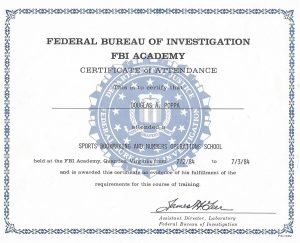 Nobody in the department had any guts to stand up to him and tell him that he was handling this whole situation wrong.
Nobody in the department had any guts to stand up to him and tell him that he was handling this whole situation wrong.
Wait, I have to make an exception on that for one person. A close friend of the sheriff who had known him for years told me early on that he had talked to Isom and told him that he better be careful on how he handled me because it could all blow up in his face. He should have listened to him.
Later I was told that an official with the Fraternal Order of Police in Washington D.C. had seen the news coverage of what I had been going through and had contacted someone he knew at CBS news and told them that there was a cop in Loudoun County that was getting screwed and maybe they would be interested in the story.
I don’t know what the law is today concerning deputy sheriffs in Virginia, but back then we were forbidden by law to belong to a union. We were also not a civil service agency. The sheriff was a constitutional officer and had the power to hire and fire at will. We pretty much had no protections at all.
I just didn’t sit back and take all this bullshit either. I had hired an attorney, a prominent one at that. He was a former federal prosecutor but best of all he was born in New York City.
When I first went to see him, I knew that there was no way I would ever be able to hire him. He asked me if I had a dollar in my pocket and to give it to him which I did. He then said I am now your attorney.
He was pretty busy with his own cases, but for months he was filing all kinds of motions and appeals with the county, but to no avail.
At the departmental grievance proceeding it was a waste of time. It was members of my own department who were on the panel. They weren’t going to side with me, they were afraid of losing their jobs.
One interesting thing came out of it though. When the sheriff was testifying at my hearing, my attorney had asked the sheriff if he had ever made derogatory remarks to the press about me, and he answered no. My attorney released the transcripts of the hearing to one of the newspapers.
After reading the sheriff’s response they knew he had perjured himself because in fact he was making derogatory remarks to the press about me.
The transcripts of the sheriff’s testimony and statements from a reporter were turned over to a supervising state trooper who turned it over to the attorney general’s office.
The AG’s office determined because the sheriff was not under oath when he testified that it was not perjury and there was nothing they could do. I guess it was okay to lie as long as you’re not under oath!
I ended up getting fired for talking to the press and related trumped up charges concerning the press. It was nothing short of retaliation. I lost my police career because I told the truth in court and would not take their abuse lying down.
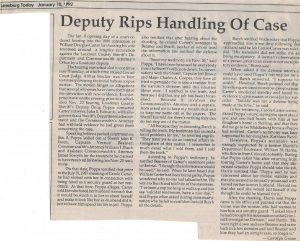 That’s what it boiled down to.
That’s what it boiled down to.
Brett Phillips, the editor of the Leesburg Today newspaper wrote an editorial on April 3, 1992 titled, “Firing A Cop.”
The Loudoun County Sheriff’s Department has fired Deputy Douglas Poppa for “allowing” a CBS crew to follow him around during the first week of March to film an upcoming segment of “Street Stories.” We wonder what would have happened to Poppa if he had arrested an entire network film crew for standing on public property. He’d probably have been fired for that, too, which says a lot about the way in which this guy has been handled by his supervisors from the outset.
Firing Poppa for being filmed from the public right of way while serving a document at a private residence is a real oddity when juxtaposed with the sheriff’s department’s seasonal habit of calling in the pres s— including film crews — to barge into private citizens’ homes during drug raids.
Poppa was also charged with refusing to stop talking to the press about an ongoing criminal investigation. Actually what he was talking about was his claim that the authorities were trashing his reputation for testifying that he had given those same authorities information in a criminal case which should have been turned over to the defense.
Throughout this process with Poppa, senior members of the sheriff’s department have made derogatory statements to this newspaper impugning the man’s character, mental state and use of prescription medicines. They’d never come right out on the record with their comments, but would dangle them and then retreat behind “no comment” when it came to gut check time. Poppa gets canned, however, for openly charging that his bosses neither supported him when he came forward, nor attempted to find out who was telling the truth by holding an internal affairs investigation about his allegations — one which would have put both Poppa and the deputy to whom he supposedly gave information on a polygraph.
Instead, the administration has concentrated its efforts on forcing Poppa to stop talking to the press by holding two internal affairs investigations over, of all things, his talking to the press. Why was the administration so determined to hammer him rather than address the very testimony which started this whole thing? Didn’t it ever occur to the administration that Poppa went to the press because he believed his career was being ruined? Because he felt he had nowhere else to go to protect himself?
The superior who gave Poppa an order to prevent the CBS crew from following him may very well have issued an order conflicting with a wide range of state and federal laws. How about that possibility as a starting point for a more interesting, and perhaps telling, internal affairs investigation? If Doug Poppa is the buffoon his supervisors make him out to be, they sure seem to have accidentally made him appear to be a cop who was railroaded for telling what he believed to be the truth — even if that information had turned out to have no bearing on the outcome of the original case.
It wasn’t over though. Carter’s retrial was set for that summer and if I was still breathing I would be a witness for the defense. They all knew that.
Two months after Judge Sinclair found my testimony credible, the testimony of the witnesses who had corroborated my testimony credible, the state police investigator who had no interest in getting to the truth during his investigation, wrote a memo to his supervisor, the special agent in charge of the state police bureau of criminal investigation.
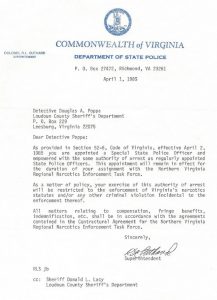 He tells his boss that on March 30, 1992 he contacted Robert Horan, Commonwealth’s Attorney for Fairfax County who was appointed by the court to prosecute William Douglas Carter in the new trial. He states he told Horan, “the testimony Poppa had provided during the habeas-corpus proceeding was suspect.”
He tells his boss that on March 30, 1992 he contacted Robert Horan, Commonwealth’s Attorney for Fairfax County who was appointed by the court to prosecute William Douglas Carter in the new trial. He states he told Horan, “the testimony Poppa had provided during the habeas-corpus proceeding was suspect.”
What evidence did he have to make that statement to Horan? No evidence, nothing, nada, zero. Again, why was it that my testimony was still suspect and not that of Burch’s or Beamer.
Was this a personal vendetta with this guy or what? If he had anything to support what he was saying why wasn’t it used by the State at the second hearing? Simple answer, they had nothing.
He seemed to forget that not only did I testify in court in front of Judge Sinclair, but so did Beamer, Burch and Carole Carter. Sinclair found my testimony credible and that of my witnesses. Even though the others disputed what I said.
What he should have done, what any competent investigator would have done, was to track down the witnesses I had told him could corroborate my testimony and conduct interviews as he had done with other people.
He never did because he was told by the attorney general’s office that his investigation had to support the State’s case, and therefore it was not an investigation to uncover the truth.
The state police investigator then continues on in his memo and states, “There does not appear to be any means of taking the issue, what motivated Doug Poppa to testify, any further at this time.”
He was either deaf, dumb and blind or sleeping since November 1991. I testified because I found out that evidence was withheld. Period. And I testified to that fact, in court, in front of Judge Sinclair.
The FBI investigation had been going on for months. The papers were reporting that the subject of the FBI investigation concerned the sheriff’s office budgeting and financial issues, asset forfeiture funds, and disposal of items seized during arrests.
Headlines in the news: Loudoun Times Mirror -‘FBI questions four, Sheriff’s Office target of probe.’
Washington Post– ‘FBI Probing Loudoun Sheriff’s Office, Sources say’.
 Washington Post- ‘Sources Say Subpoenas Were Issued in Probe of Loudoun Sheriff’s Office.’
Washington Post- ‘Sources Say Subpoenas Were Issued in Probe of Loudoun Sheriff’s Office.’
On April 23, 1992 the headline on the front page of the Loudoun Times Mirror read, ‘FBI seizes boxes of documents at Sheriff’s Office’. A photograph showed two FBI agents carrying boxes of documents from the sheriff’s office into their vehicle.
Earlier I had stated that the strong-arm of the law was deceitful and malicious. In Loudoun County at that time, it most certainly was.
When the highest law enforcement officer in the county makes a statement to the press, on the record this time, which was a refreshing change, then does something that contradicts what he just said, then if the shoe fits, wear it.
What am I talking about? In March 1992, the Washington Post ran a story about Sheriff John Isom titled, ‘In Loudoun, a Trouble-Shooter with Troubles of His Own.’
According to the article … And he [Isom] said the idea of the FBI asking questions about his department does not concern him. “It really doesn’t bother me, there’s nothing here,” said Isom. “I really don’t care.” The article goes on, sources in the sheriff’s office also say Isom appears to them to be un-easy about the continuing FBI investigation. One sheriff’s official said Isom asks members of his department to keep him posted about what they have heard. Several sheriff’s office employees, who asked not to be identified, say Isom and his leading officers have expressed anger about a Circuit Court decision last month overturning the conviction of William Douglas Carter.
Sheriff John Isom no matter what he said to the Washington Post in that article about not caring about the FBI investigation, oh he most certainly did care.
I received a call one day from one of the cops who kept in contact with me. He tells me that the sheriff had just put out a memo to the entire department stating that if the FBI contacts any employee they should call his personal attorney and have him go with them when they are interviewed by the FBI.
I couldn’t believe it, could anyone be that stupid and brazen, I thought.
I called one of the FBI agents that was involved in the investigation and told him what I had heard. He said they wanted a copy of the memo. I called my contact back and later received a copy. One copy went to the FBI and another to a reporter.
What better way to intimidate cops than to tell them that if the FBI wants to interview you, have my personal attorney go with you. Did anyone really think that a cop would talk about their boss to the FBI while the boss’s attorney was sitting right next to them?
That would have been a good-bye to your police career. This was the head of Loudoun County’s law enforcement at his finest hour! It sounded like hindering a federal investigation. Maybe that should have been the subject of an investigation in and of itself.
The Loudoun Times Mirror wrote in an article, “A department memo to deputies, obtained by a local newspaper and confirmed through sources inside and outside the Sheriff’s Office, advises deputies to contact the law offices of Slenker, Brandt, Jennings and Johnston if they are approached by FBI agents and to have one of the attorneys accompany the deputies on interviews with the FBI. Sources close to the Sheriff’s Office say the memo is a warning to deputies not to cooperate with the FBI.”
Need I say anything more on that? After being fired I kept busy as much as possible. I was a court-appointed defense investigator in a murder case.
Another attorney had asked me to review the case of William Evans-Smith, a former American University professor who had been convicted in Loudoun County of murdering his wife years before. At the attorney’s request, I had gone down to the state prison and conducted an interview with Evans-Smith.
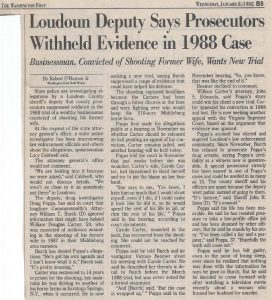 As for William Douglas Carter.
As for William Douglas Carter.
I testified at his new trial in the summer of 1992 along with other witnesses.
One witness who testified, Suzanne Culver-Jones, wrote in a sworn affidavit before the new trial that before the original trial of William Douglas Carter in 1988, “I told the police that the shooting occurred around 1:15 a.m. or 1:20 a.m. Jeff Brown of the Loudoun County Sheriff’s Department told me that the shooting had to have occurred closer to 2:00 a.m. since Doug Carter did the shooting and he was in Saratoga [NY] and it takes so many hours to get there from the farm.”
“Before the trial, the Commonwealth’s Attorney coached me on what I should say at trial. I was instructed by the Commonwealth’s Attorney not to say that Carole [Carter] said “Doug shot me with my .38, even though I told him that Carole did say “Doug shot me with my .38.”
One person who did not testify who had testified at Carter’s original trial in 1988 was the sheriff. In the first trial of William Douglas Carter, the prosecutor’s theory had to do with William Carter’s knowledge of the caliber of his wife’s gun. Burch said Carter couldn’t know the caliber of the gun unless he did the deed.
But since that trial, Carter’s defense team alleged that Sheriff Isom lied when he said he didn’t know the caliber of the gun.
Before the retrial the Washington Post reported in an article, ‘And two people have signed affidavits that have raised questions about Isom’s testimony in that 1988 trial. A new trial raises the possibility that Isom’s word will be challenged in court by the people who signed the affidavits. At issue is whether Isom told a farm worker and a friend of Carter’s what type of gun had been used in the shooting in the morning hours after the shooting. Isom testified in the 1988 trial that he did not know then, in the hours after the shooting, that a .38 caliber handgun had been used, but those who signed the affidavits contend there is no question that Isom told them about the gun. The issue is important because prosecutors said only police and the gunman could have known. Prosecutors used Carter’s knowledge of the gun to help convict him.’
There was no way Sheriff John Isom could take the stand. What was the prosecutor going to do?
Well, at the new trial Fairfax County Commonwealth’s Attorney Robert Horan saw to it that this gun theory was gone, invisible. It couldn’t withstand jury scrutiny because the Sheriff couldn’t withstand scrutiny.
So Horan cooked up a new theory based on the alleged imprint of a bloody rubber glove on the banister in Mr. Carter’s home. Five years after Carole Carter was shot, or I should say, shot herself, for the first time during the second trial, prosecutor Horan had the lab analyze the glove imprint.
On the witness stand, Suzanne Culver-Jones, speaking about William Burch prior to Carter’s first trial, testified, “I was told at the time that it was very important that if anything is brought up about the gun, it was not necessary to say anything about what kind of gun it was, just say that I don’t recall because of the fact that Mr. Carter’s attorneys were going to try to make it look like a suicide, and it was not necessary for me to say anything about the .38, for me to just say I don’t recall.”
Burch testified, “I don’t recall her saying anything about the gun, the .38 caliber or anything like that.”
Really. A prosecutor would not “recall” if a witness who was in the house the night Carole Carter was shot, had mentioned anything about the gun Carole Carter was shot with.
Carole Carter testified that her ex-husband was wearing rubber gloves and that after shooting her, he grabbed her hand and forced her hand to grasp the gun. After he left she said she wrote his name on the floor with her own blood just in case she died.
I will tell you one thing right now. If somebody tried to kill me and then placed a loaded gun in my hand and turned their back and walked away, they are going to have some ventilation holes in their back.
And that testimony about writing his name in blood. Sounds like something right out of a mystery novel.
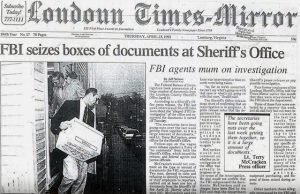 Her testimony was pure fantasy.
Her testimony was pure fantasy.
The new jury also heard from the emergency room doctor who treated Carole Carter after she was shot. He testified that the wound he saw did not purport to how Carole Carter told him she was shot.
The jury also heard from a friend of Carole Carter who testified, “I know one time she told me that she would do anything to get back at him. I know she told me that he had a lot of money and that she felt that she deserved more than she was getting out of the divorce, and she was very angry about this.”
A former employee of Carole Carter testified that she was unstable.
On July 28, 1992 after hearing all the testimony the jury acquitted William Douglas Carter.
After the trial, Robert Horan approached me outside the Loudoun County Courthouse and asked me if Carole Carter had really made the statement to me about shooting herself to frame her husband.
After months of all the bullshit I had gone through, I felt like hitting him right in his face. I kept my composure though, which was hard to do, and responded, “That’s a pretty stupid question isn’t it.” He turned and walked away.
Sheriff John Isom told the Washington Post after the retrial that he had supported me all along. Unbelievable. The sheriff was truly a unique piece of work.
In June of 1992 about two months after I was fired by the sheriff, I was approached by a former sheriff’s office lieutenant, Donald Moore, who attempted to recruit me in a plot to kidnap an heir and his wife to the Dupont Chemical fortune.
I immediately notified the FBI and was asked to work with them and infiltrate the group.
 During the three-month undercover operation I had covertly recorded over sixty hours of conversations with the suspects on hidden tape recorders and body wire transmitters. Court ordered wiretaps were also installed on the suspect’s telephones.
During the three-month undercover operation I had covertly recorded over sixty hours of conversations with the suspects on hidden tape recorders and body wire transmitters. Court ordered wiretaps were also installed on the suspect’s telephones.
The suspects were later indicted on conspiracy to commit kidnapping charges and arrested by special agents of the FBI.
I am not going to get into this whole case now, it will be another story to write at another time; it is way too involved.
What is interesting though is what happened during the trial. In October 1992 after the undercover operation was over, the FBI said I had to get away from the area.
I left Loudoun County and re-located to Denver, Colorado. I never resided in Loudoun County again.
Photos and documents provided by Doug Poppa.
Top photo: Poppa with ATF Undercover Special Agent, William Queen (ret.)
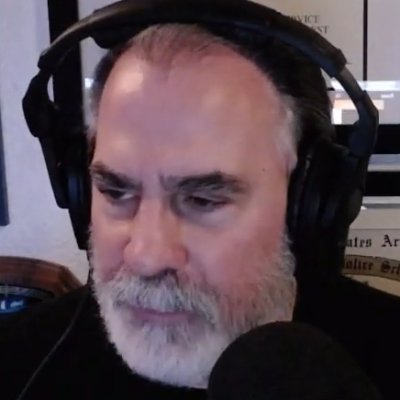
Doug authored over 135 articles on the October 1, 2017, Las Vegas Massacre, more than any other single journalist in the country. He investigates stories on corruption, law enforcement, and crime. Doug is a US Army Military Police Veteran, former police officer, deputy sheriff, and criminal investigator. Doug spent 20 years in the hotel/casino industry as an investigator and then as Director of Security and Surveillance. He also spent a short time with the US Dept. of Homeland Security, Transportation Security Administration. In 1986 Doug was awarded Criminal Investigator of the Year by the Loudoun County Sheriff’s Office in Virginia for his undercover work in narcotics enforcement. In 1991 and 1992 Doug testified in court that a sheriff’s office official and the county prosecutor withheld exculpatory evidence during the 1988 trial of a man accused of the attempted murder of his wife. Doug’s testimony led to a judge’s decision to order the release of the man from prison in 1992 and awarded him a new trial, in which he was later acquitted. As a result of Doug breaking the police “blue wall of silence,” he was fired by the county sheriff. His story was featured on Inside Edition, Current Affair and CBS News’ “Street Stories with Ed Bradley”. In 1992 after losing his job, at the request of the Federal Bureau of Investigation, Doug infiltrated a group of men who were plotting the kidnapping of a Dupont fortune heir and his wife. Doug has been a guest on national television and radio programs speaking on the stories he now writes as an investigative journalist. Catch Doug’s Podcast: @dougpoppa1
